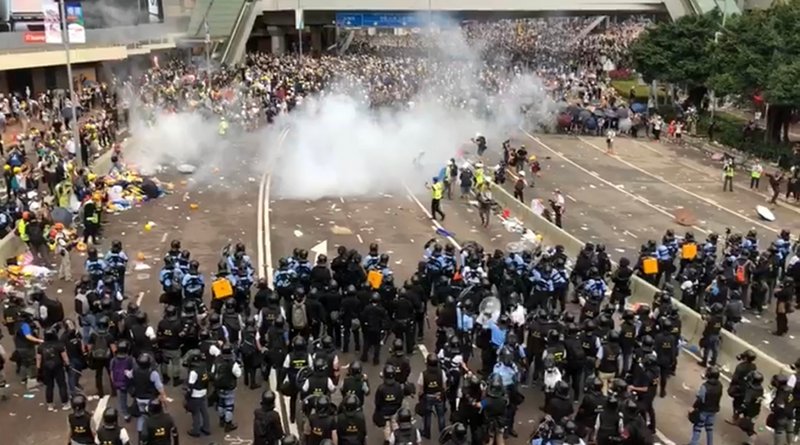China: 12 Hong Kong Protesters Held Incommunicado, Says HRW
The Chinese authorities should allow 12 detained Hong Kong pro-democracy protesters, including one child, access to family members and their own lawyers and physicians, Human Rights Watch said Monday. The group has been held incommunicado in Shenzhen’s Yantian Detention Center since August 23, 2020.
Detention center authorities said the 12 detainees are suspected of “unlawfully crossing the border,” which carries a sentence of up to one year in prison. But a Chinese government spokesperson said the 12 are “separatists,” a crime that can carry the death penalty in “egregious cases.”
“The Chinese authorities should respect their own laws and allow the 12 Hong Kong detainees access to their relatives and lawyers,” said Maya Wang, senior China researcher at Human Rights Watch. “The Chinese government seems determined to treat Hong Kong protesters in custody as badly as it has long treated mainland activists.”
On August 23, the Chinese coast guard intercepted a boat sailing from Hong Kong to Taiwan and detained all 12 people aboard. The group, ages 17 to 33, includes Andy Li, an activist who had been arrested in Hong Kong on August 10 for “colluding with foreign elements” under Hong Kong’s new draconian National Security Law. The others were protesters accused of arson, rioting, assaulting the police, and other crimes under Hong Kong law, and were either wanted by the Hong Kong police or had been barred from leaving the city under bail conditions. None have been formally charged. Human Rights Watch does not have information regarding the merits of the underlying criminal cases.
Chinese authorities have threatened mainland lawyers hired by the protesters’ families to represent the 12 with “serious consequences for their career,” stating that the case is “very sensitive” as it involves the National Security Law. Five of the lawyers have dropped the case as a result of the threats, and those who went to the detention center have been denied access to their clients. The detention authorities – and Hong Kong Secretary of Security John Lee – claimed that the 12 had already accepted government-appointed lawyers. Their families, however, said they rejected those lawyers.
Under China’s Criminal Procedure Law, suspects have the right to appoint lawyers of their choice as soon as they are under any of compulsory police measures, and to meet with those lawyers. Legal representation is compulsory for those accused of crimes that might lead to life in prison or the death penalty, or for suspects under age 18. In practice, especially in politically sensitive cases, detention center authorities and police often deny suspects access to lawyers, and subject them to months of enforced disappearance during which they may face torture and other ill-treatment.
Under Chinese law, police can detain citizens for up to 37 days before the procuratorate approves their arrest or release. Since police formally detained the group on August 25, the authorities will have to announce by October 1 whether each of the 12 will be formally arrested or released. The police can also subject people to up to six months of secret detention known as “residential surveillance in a designated location.”
Hong Kong authorities, while vowing to “actively follow up” on the case, also said that it would be “difficult” to seek their extradition to Hong Kong, and that the mainland authorities have jurisdiction over the 12 detainees. Hong Kong officials also said that mainland authorities had conveyed to them that the 12 “are in good health,” but have made no effort to seek access to the detainees. Among the group, three require medication to manage chronic conditions including asthma and depression; the families said they fear the detained have no access to medical care.
One detainee, Kok Tsz-Lun, 18, a Hong Kong University student, is a dual Hong Kong-Portugal national. The Vienna Convention on Consular Relations permits Portuguese consular officers to visit Kok in detention and arrange legal representation for him. The Portuguese consulate should immediately seek to meet with Kok if it has not done so already, Human Rights Watch said.
Among the group, Wong Lam-Fok, is 17. Under international human rights law, the arrest, detention, or imprisonment of a child under the age of 18 may be used only as a measure of last resort and for the shortest appropriate period. Every detained child has the right to maintain contact with his or her family through visits and correspondence. Moreover, any detained child has the right to prompt access to legal and other appropriate assistance, as well as the right to challenge the legality of the detention before a court or other independent and impartial authority, and to a prompt decision on any such action.
The Hong Kong government should seek access to the 12 detainees and provide robust assistance to ensure that their rights are respected by mainland authorities.
“People in Hong Kong and abroad are watching how the Chinese government deals with these Hong Kong cases,” Wang said. “The Chinese government needs to show the world it can uphold its own laws and international obligations.”

